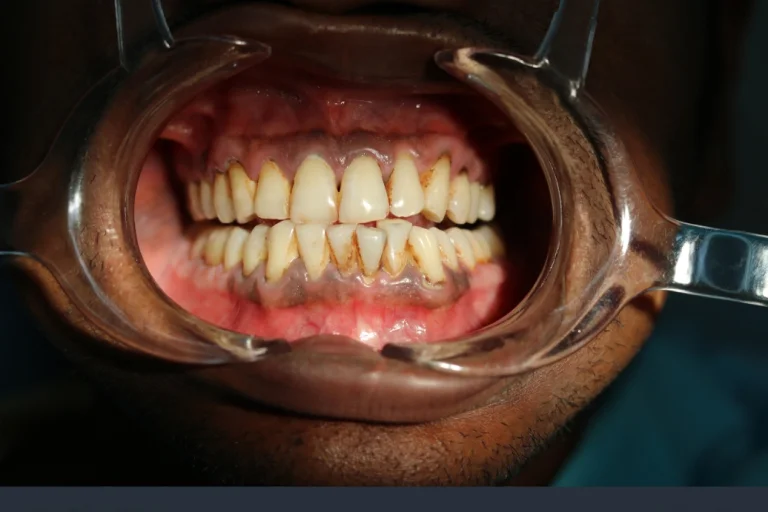
- Home
- About
- Our Team
- Services
- Postoperative Care
- Smile Gallery
- Medical Tourism
- Blog
- Offers
- Contact Us
- Home
- About
- Our Team
- Services
- Postoperative Care
- Smile Gallery
- Medical Tourism
- Blog
- Offers
- Contact Us

Every person’s skin tone varies; likewise, gums come in different colour shades for each person. If you have too much melanin, then the gums can come in dark shades for you, and that is normal. But if your natural gum colours are not dark and suddenly appear dark, then it might be due to smoking, side effects of certain medications, or it may be a sign of any condition.
This article lets you understand what black or dark-coloured gums signify, what causes black gums and how to get rid of the black gums.
Having dark or black gums is not a cause of concern because, in many cases, it’s a normal variation of pigmentation among individuals with darker skin tones, and these naturally darker gums are not a health concern. But sometimes, a sudden change in gum colour or the darkness is patchy, uneven or accompanied by other symptoms like pain, bleeding or swelling then, which could signify some issues.
Here are a few possible reasons for black gums,
Knowing the cause of your gum colour change is the first step in determining if it’s a harmless one or a symptom of something serious.
Several causes of black or dark gums can be either harmless or potentially concerning. That includes,
This is the most common and natural reason for black gums. Just as skin tones vary with ethnicity, so do gum colours. In this case, no treatment is required unless the individual wants a cosmetic change.
A smoker’s melanosis is a condition in which smoking stimulates melanin production, and it leads to darker gums. It typically affects the front part of the gums and is more common in long-term smokers.
Certain medications can lead to gum discolouration. These include:
If you’re on any long-term medication and notice a change in gum colour, then speak to your doctor or dentist.
When a dental filling or crown made from silver amalgam is placed, tiny particles can become embedded in the gum tissue and cause a dark or bluish-grey spot. This is harmless but permanent.
Gum infections and diseases such as gingivitis or periodontitis can cause changes in gum colour. Inflammation of gum disease can lead to redness and, in more severe cases, tissue death (necrosis), which can cause black or grey patches.
In very rare cases, dark gums may indicate systemic health problems like Addison’s disease or Peutz-Jeghers syndrome. These conditions can cause pigmentation changes in the mouth and should be diagnosed by a medical professional.
The treatment for black or dark gums depends on the cause. If you are having natural pigmentation then no medical treatment is necessary, though cosmetic options are available. However, if the discolouration is due to lifestyle or health conditions, then addressing the root cause is the key.
If smoking is the cause of your dark gums, quitting can gradually reduce melanin production. After quitting, the dark pigment may not disappear entirely, and it can fade over time.
For those who are concerned about dark gums for cosmetic reasons, then you can do a gum depigmentation procedure, which is a dental procedure that lightens the colour of the gums. Techniques include:
These procedures are generally safe and effective but are considered cosmetic, so they may not be covered by insurance.
Suppose an underlying condition is causing gum discolouration, such as a medication side effect or a systemic illness. In that case, the solution lies in adjusting medication or addressing the root cause with your healthcare provider.
Regular brushing, flossing, and dental check-ups can help prevent gum infections and maintain overall gum health. This won’t reverse pigmentation but can prevent other complications.
While natural dark gums aren’t a concern, you should visit your dentist if,
Your dentist can perform an oral exam, review your medical history, and determine if the pigmentation is harmless or needs further investigation.
Black or dark gums can be entirely natural for many people, especially those with more melanin in their skin. However, changes in gum colour should never be ignored, especially if they are sudden or accompanied by other symptoms. Never worry as the treatment options are available depending on the root cause in the form of both medical and cosmetic.
So, if you’ve noticed changes in your gum colour, don’t panic, but consider contacting the nearby dentist. Visit Oris Dental Center to identify the root cause and treat black gums.